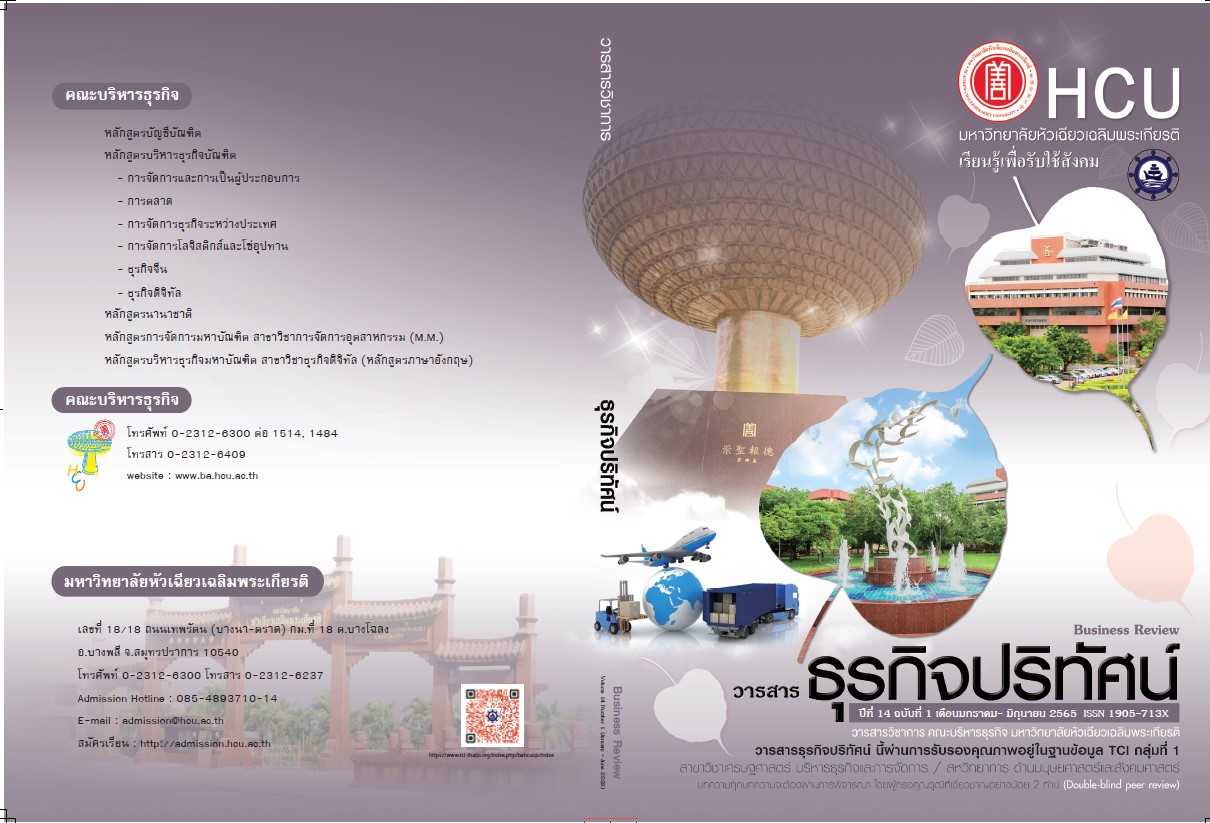Knowledge Transfer and Its Impacts on Software Development in a Multinational Enterprise
Keywords:
Knowledge transfer, Software development, Multinational enterpriseAbstract
This research study aims to investigate the factors that influence the effectiveness of knowledge transfer in the software development of a multinational enterprise. The comparison studies all factors of personnel at the headquarters in the United Kingdom and subsidiaries in Thailand and proposes ways to effectively transfer appropriate knowledge between staff in each country. The research methodology consisted of a literature review, observations, and interviews. Data collection was conducted using a set of questionnaires and analyzed using exploratory factor analysis and structural equation modeling (SEM). Research findings revealed five groups of factors that affected knowledge transfer related to software development in a multinational enterprise: internal organizational management, organizational culture, working contexts, knowledge transfer process, and people’s capabilities. These findings can be applied to working plans between software development teams of transnational corporations with different working styles in terms of systems, thinking methods, attitudes, cultures, language, or even working schedules. These differences can influence collaborative work. A good plan enhances effective learning and knowledge transfer, leading to the success of the project operation.
References
Akan, H., Izbirak, G., Kaspar, C., Kaya, C., Aydin, S., Demircan, N., Bucaktepe, P., Özer, C., Aahin, H., & Hayran, O. (2012). Knowledge and attitudes towards complementary and alternative medicine among medical students in Turkey. The Official Journal of the International Society for Complementary Medicine Research, 12(115), 1–7.
Allred, B. (2001). Enabling knowledge creation: How to unlock the mystery of tacit knowledge and release the power of innovation. The Academy of Management Executive, 15(1), 161–162.
Aurum, A., Daneshgar, F., & Ward, J. (2008). Investigating knowledge management practices in software development organisations – An Australian experience. Information and Software Technology, 50(6), 511–533.
Carmel, E., & Agarwal, R. (2001). Tactical approaches for alleviating distance in global software development. IEEE Software, 18(2), 22–29.
Child, J., & Rodrigues, S. (1996). The role of social identity in the international transfer of knowledge through joint ventures. In S.R. Clegg and G. Palmer (Eds.), The politics of management knowledge (pp. 46–68). London: SAGE Publishing.
Chen, C.-J., Hsiao, Y.-C., & Chu, M.-A. (2014). Transfer mechanisms and knowledge transfer: The cooperative competency perspective. Journal of Business Research, 67(12), 2531–2541.
Conchúir, E., Olsson, H. H., Ågerfalk, P. J., & Fitzgerald, B. (2009). Benefits of global software development: Exploring the unexplored. Software Process Improvement and Practice, 14, 201–212.
Damian, D., & Moitra, D. (2006). Guest editors’ introduction: Global software development: How far have we come?. IEEE Software, 23(5), 17–19.
Davel, R., Du Toit, A. S. A., & Mearns, M. (2017). Understanding knowledge networks through social network analysis. International Journal of Knowledge Management, 13(2), 1–17.
Dingsøyr, T., & Smite, D. (2014). Managing knowledge in global software development projects. IEEE IT Professional, 16(1), 22–29.
Distanont, A., Haapasalo, H., Rassameethes, B., & Lin, B. (2012). Knowledge transfer pattern
in collaborative product development. International Journal of Intercultural Information Management, 3(1), 59–81.
Distanont, A., Haapasalo, H., Kamolvej, T., & Meeampol, S. (2012). Interaction patterns in collaborative product development (CPD). International Journal of Synergy and Research, 1(2), 21–43.
Distanont, A., Haapasalo, H., Vaananen, M., & Lehto, J. (2012). The engagement between knowledge transfer and requirements engineering. International Journal of Management, Knowledge and Learning, 1(2), 131–156.
Distanont, A., Haapasalo, H., & Vaananen, M. (2014). Organising knowledge transfer in requirements engineering over organizational interfaces. International Journal of Innovation and Learning, 15(1), 41-64.
Ebert, C., & De Neve, P. (2001). Surviving global software development. IEEE Software, 18(2), 62–69.
Goh, S. (2002). Managing effective knowledge transfer: An integrative framework and some practice implications. Journal of Knowledge Management, 6(1), 23–30.
Griffit, T., & Sawyer, J. (2006). Supporting technologies and organizational practices for the transfer of knowledge in virtual environments. Group Decision and Negotiation, 15(4), 407–423.
Hair, J., Black, W., Babin, B., & Anderson, R. (2010). Multivariate data analysis (7th ed.). Upper Saddle River, NJ: Prentice-Hall, Inc.
Herbsleb, J. D., & Moitra, D. (2001). Global software development. IEEE Software, 18(2), 16–20.
Hooper, D., Coughlan, J., & Mullen, M. (2008). Structural equation modelling: Guidelines for determining model fit. Electronic Journal of Business Research Methods, 6(1), 53–60.
Ismail, M., Hamzah, S., & Bebenroth, R. (2018). Differentiating knowledge transfer and technology transfer: What should an organizational manager need to know?. European Journal of Training and Development, 42(9), 611–628.
Islam, M., Jasimuddin, S., & Hasan, I. (2018). Determinants that influence knowledge sharing: An integrated literature review. International Journal of Knowledge Management Studies, 9(4), 363–380.
Jalal, H. A., & Toulson, P. (2018). Knowledge sharing and organisational culture: The hidden moderator for competitive advantage. International Journal of Knowledge Management Studies, 9(4), 325–341.
Ko, D-G., Kirsch, L. J., & King, W. R. (2005). Antecedents of knowledge transfer from consultants to clients in enterprise system implementations. MIS Quarterly, 29(1), 59–85.
Koloniari, M., Vraimaki, E., & Fassoulis, K. (2019). Factors affecting knowledge creation in academic libraries. Journal of Librarianship and Information Science, 51(1), 20-33.
Marianne, K. (2013). Knowledge sharing barriers of acquisitioned growth: A case study from a software company. International Journal of Engineering Business Management, 5(8), 18–29.
McKeough, A., Lupart, J., & Marini, A. (1995). Teaching for transfer: Fostering generalization in learning. Washington: Lawrence Erlbaum Associates, Inc.
McFarlan, F.W., & Wong, J. (2012). China's growing it services and software industry: Challenges and implications. MIS Quarterly Executive, 11(1), 1–9.
Moud, H. I., & Abbasnejad, B. (2012). Factors affecting knowledge transfer in project based organizations. 1thInternational Conference of the Asia Chapter & 2nd Conference of the MENA Chapter of the Academy of Human Resource Development & 10th International Conference on Knowledge, Economy and Management, Istanbul, Turkey.
Nidhra, S., Yanamadala, M., Afzal, W., & Torkar, R. (2013). Knowledge transfer challenges and mitigation strategies in global software development—A systematic literature review and industrial validation. International Journal of Information Management, 33(2), 333–355.
Noll, J., Beecham, S., & Richardson, I. (2010). Global software development and collaboration: Barriers and solutions. ACM Inroads, 1(3), 66–78.
Palvalin, M., Vuori, V., & Helander, N. (2018). The relation between knowledge transfer and productivity in knowledge work. Journal of Knowledge Management Research & Practice, 16(1), 118–125.
Peyman, A., Zahedi, M. R., & Hosein, S. H. (2014). A conceptual framework to address barriers to knowledge management in project-based organizations. Education, Business and Society: Contemporary Middle Eastern Issues, 7(2/3), 98-119.
Rahman, M., Moonesar, I., Hossain, M., & Islam, M. (2018). Influence of organizational culture on knowledge transfer: Evidence from the government of Dubai. Journal of Public Affairs, 18, 1–13.
Riege, A. (2007). Actions to overcome knowledge transfer barriers in MNCs. Journal of Knowledge Management, 11(1), 48–67.
Rocha, T., & Terra, J. C. (2009). MNC knowledge transfer, global integration, and local responsiveness in Brazilian subsidiaries. Internext – Revista Eletrônica de Negócios Internacionais, São Paulo, 4(1), 20–39.
Sahay, S. (2003). Global software alliances: The challenge of standardization. Scandinavian Journal of Information Systems, 15, 3–21.
Saker, S., Saker, S., Nichloson, D. B., & Joshi, K. D. (2005). Knowledge transfer in virtual systems development teams: An exploratory study of four key enablers. IEEE Transactions on Professional Communication, 48(2), 201–218.
Spender, J. C. (1996). Organizational knowledge, learning, and memory: Three concepts in search of a theory. Journal of Organizational Change Management, 9(1), 63–78.
Staples, D. S., & Webster, J. (2008). Exploring the effects of trust, task interdependence and virtualness on knowledge sharing in teams. Information System Journal, 18, 617–640.
Taweel, A., Delaney, B., Arvanitis, T. N., & Zhao, L. (2009). Communication, knowledge and co-ordination management in globally distributed software development. 4thIEEE International Conference on Global Software Engineering, 13-16 Jul 2009, Limerick, Ireland: IEEE Publisher.
The Computing Technology Industry Association. (2018). IT Industry Outlook 2018. Retrieved August 8, 2019, from The Computing Technology Industry Association Website: https://www.comptia.org/resources/it-industry-trends-analysis.
West, G. P., and Noel, T. W. (2009). The impact of knowledge resources on new venture performance. Journal of Small Business Management, 47(1), 1–22.
Wolf, E. J., Harrington, K. M., Clark, S. L., & Miller, M. W. (2013). Sample size requirements for structural equation models: An evaluation of power, bias, and solution propriety. Educational and Psychological Measurement, 76(6), 913–934.
Zahran, A. S., Hackney, R., & Ozkan, S. (2011). Factors impacting knowledge transfer success in information systems outsourcing. Journal of Enterprise Information Management, 24(5), 455–468.
Zhao, D., Zuo, M., & Deng, X. (2015). Examining the factors influencing cross-project knowledge transfer: An empirical study of IT services firms in China. International Journal of Project Management, 33(2), 325–340.
Zho, M., Zhao, D., & Gao, P. (2013). Models for describing knowledge transfer mechanisms. Scientific Journal of Management Science and Engineering, 3(3), 63–72.
Downloads
Published
How to Cite
Issue
Section
License
Copyright (c) 2022 Business Review Journal

This work is licensed under a Creative Commons Attribution-NonCommercial-NoDerivatives 4.0 International License.
All articles published in the Business Administration and Management Journal Review are copyrighted by the journal.
The views and opinions expressed in each article are solely those of the individual authors and do not represent those of Huachiew Chalermprakiet University or any other faculty members. Each author is fully responsible for the content of their own article. Any errors or issues found are the sole responsibility of the respective author.




